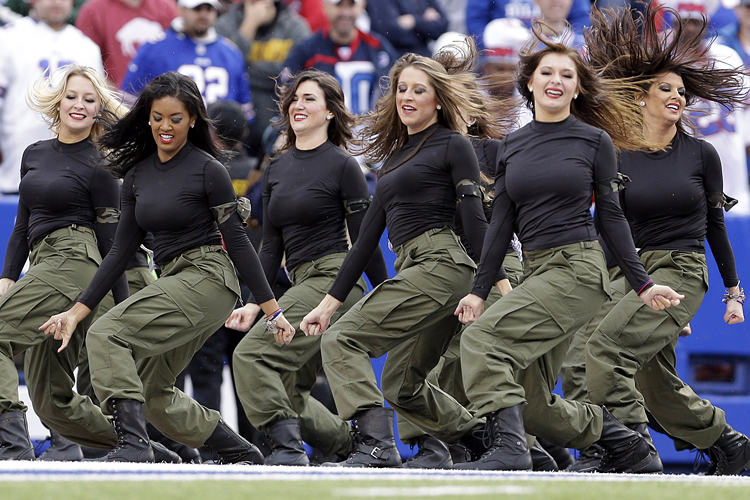The NFL released on Wednesday its new personal conduct policy, its latest attempt at the appearance of transparency and consistency when disciplining players. It also serves as the most recent round of image rehabilitation as the NFL, in the wake of a series of high-profile domestic violence cases that it handled callously and bizarrely ad hoc, tries to show that it cares about women’s lives.
A piece published by the New York Times, also on Wednesday, will not help the NFL make its case. Five women who performed as cheerleaders with the Buffalo Bills are now suing the team, alleging it violated New York’s minimum wage laws by denying them pay for their work. But, according to the Bills, the cheerleading squad that they have total control over is, in fact, an “ancillary service” and not employed by the franchise.
In typical fashion, Roger Goodell has said virtually nothing about Bills’ and other franchises’ failures to fairly compensate cheerleaders. “I have no knowledge,” he wrote in an affidavit obtained by the Times, of the “selection, training, compensation and/or pay practices” of cheerleaders. (His signature is nonetheless on the contract.)
This is part of a pattern, of course. So if the league wants to show that it values women, then it needs to do better than, You can’t beat or kill them but we’re not interested in much else.
The Buffalo Bills were just bought for $1.4 billion and pay its coach $3.5 million, and yet it does not pay a single cent to the women who are logging hours dancing in support of the franchise. According to the Times, one of the women behind the suit, Alyssa, said she made $420 for more than 800 hours of work. Another woman involved in the suit, Maria, made even less at $105.
There’s more to this story than workers being denied wages by a greedy corporate franchise. It seems that being a “Jill” — the name affectionately (or creepily, your choice) given to the cheerleaders — requires quite a lot more than strong legs and a cheerful disposition.
From the Times:
The team’s contractor handed the women a contract and a personnel code, and told them to sign on the spot. The team dictated everything from the color of their hair to how they handled their menstrual cycle.
The contractor required they visit a sponsor who was a plastic surgeon. He offered a small discount if they opted for breast augmentation and other services. Larger breasts, however, were not a condition of nonpaid employment.
“If you complained, you were told: ‘This is a privilege. Deal with it!’” Alyssa recalled.
The Jills were also required to attend something called a “Men Show” where they were “leered [at] and grabbed” by men. One event for sponsors featured something called “Flips for Tips” where the Jills, wearing bikinis, did backflips. Men also bid on which of the women would ride with them in their golf carts, either by holding onto the back or sitting on their laps.
The entire Times report feels like something out of “Wolf of Wall Street.” And the Jills aren’t the first to sue or report that similar harassment was considered part of the job. The Oakland Raiders recently agreed to pay the Raiderettes a minimum wage after a lawsuit, and cheerleaders with other teams have also taken legal action and alleged similar harassment and mistreatment.
Back in September, Fox Sport’s Katie Nolan took on the sexist hierarchy within sports reporting as one of the reasons that the NFL has gotten away with its treatment of women for as long as it has without being called out:
Women in sports television are allowed to read headlines, patrol sidelines, and generally facilitate conversation for their male colleagues. Sometimes, they even let us monitor the internet…from a couch. And while the Steven A. Smiths, Mike Francescas, Dan Patricks, and Keith Olbermanns of the world get to weigh in on the issues of the day, we just smile and ‘throw to commercial.
Nolan is acutely aware of the hierarchy within sports media, just as the Buffalo Jills are acutely aware of their place within their teams, just as the players’ wives and girlfriends are acutely aware of their role in the league itself.
The NFL is on a mission right now to show how much it values women. If it wants to make good on that, it should maybe try paying them.


